More than 5,000 farmers belonging to KMP Southern Mindanao Region joined the protest against CARPer and SDO on October 21 to 22, 2010 in Davao City.
Situation of Farmers in Mindanao, Davao City
As landlessness, hunger, militarization, and rights abuses mark the plight of the Filipino farmers, we from local peoples organizations under the Kilusang Magbubukid ng Pilipinas (KMP – Southern Mindanao) affirm our unwavering commitment to advance the struggle for genuine agrarian reform, food sovereignty, social justice, and national patrimony.
The first 100 days of the Aquino administration have affirmed the fears of the peasantry that the P-Noy Administration has no heart nor the political intent to uplift the plight of the farmers.
Despite its avowals of revitalizing the agricultural industry, the Aquino administration has no concrete policies that are being implemented to reverse the past administration’s economic and political mistakes. The Arroyo regime has put in place the mechanisms for the demise of the local agricultural industry, the dis-empowerment of the Filipino farmers, and the violations of their basic human rights.
Instead, the Aquino administration’s 20–year peace and development road-map, which identifies energy generation, “responsible” mining, aqua and marine culture, and infrastructure all foretell that this policy hence, is no different from the Arroyo administration’s creation of Mindanao as a super region.
This road-map will further subject the farmers and the local agricultural industry into a deep crisis and will further undermine their right to land and to life.
The massive conversion of agricultural lands into mono-crop plantations for agri-business ventures of transnational corporations such as Del Monte, DOLE, STANFILCO, LA PANDAY, to name a few, have turned self – reliant farmers and village economies like “slaves” to foreign corporations. As of 2005, 26,000 hectares of agricultural lands have been documented to have been converted into banana plantations while more than 40,000 (estimated figure based on 91% production share of Mindanao in pineapple prod & the 70,000 has land allotted to pineapple in the country) hectares were converted into pineapple plantations and processing plants.
Contract growership agreements have only favored the profit – oriented interests of the TNCs/MNCs. Crops are bought at unreasonably low prices and worse is that the growers alone suffer the losses brought about by calamities like El Nino, pest infestation and others. Mindanao, from where 40% of the country’s food products come from, have suffered from food and rice shortage in 2009.
Farmers – turned workers in crop processing plants suffer from wages that are below the minimum wage, and from government-dictated minimum wages that barely compensate their labor. Worse, contractualization, union busting, and other labor-related abuses continue to be rampant today.
Large-scale Mining affects the peasantry in Compostela Valley
The encroachment of large scale and foreign investments by foreign mining TNCs, in Mindanao have disenfranchised farmers and indigenous peoples from their rights to land, and their basic human rights as a whole . In Compostela Valley Province alone, which is known for its large deposits of gold, mining applications have gobbled up 214,715.14 hectares of land, while agricultural development covered only 119,600 hectares.
Compostela Valley is also host to the large-scale operations of Echo Bay, Toronto Ventures and Crew Minerals, to name a few, which are all Canadian-owned mining corporations. Meanwhile, mineral rich lands Diwalwal and Pantukan are targeted by large scale mining operations in order to address the increasing demands for minerals of 1st world countries. Amidst this, mining TNCs have continued to evade paying reparation to the people and communities affected by mining – related environmental destruction and tragedies such as those that happened in Kingking, Pantukan, Masara, New Leyte, Compostela Valley Province.
The deregulated and export-oriented mining operations in the country has also posed environmental and economic risks --- the impact of toxic pollution caused by lead, arsenic and mercury that come from the processing of gold and minerals and landslides in mining areas have been well documented problems caused by large scale mining.
Failure of CARP
Amidst this, the failure Comprehensive Agrarian Reform Program (CARP) which was extended for another 5 years under the Arroyo administration is ominous.
In the Davao Region for instance, where population of farmers would account for 60-70% of the total population, the DAR on the other hand has only distributed lands to as much as 140,000 agrarian reform beneficiaries.
70% of the “landed” farmers in Davao region till only about 2 hectares of land, whose yields are hardly able to sustain their basic needs for food. While generally, 7 out of 10 farmers do not own the land they till. 90% of the farmers in Lomundao, Marilog and Paquibato District in Davao City, for instance, who have been tilling the land for around 30 to 50 years have only been awarded stewardship rights and are now threatened to be displaced by mining, and massive land conversion due to a jathropa plantation and state-declared reservation area.
Militarization and Human Rights Abuses
The lack of social services such as access to primary and secondary education and access to medical health services in rural poor communities have worsened the situation of hunger and poverty experienced by the peasantry.
On top of these, we, farmers also suffer from the dehumanizing consequences of militarization patterned after the military counter insurgency plan Oplan Bantay Laya 2. In the 3rd Quarter of this year in Davao Region alone, two farmers from Paquibato District and one farmer from Mawab have been brutally slain.
Justice continues to evade the families of Farmers Association of Davao City (FADC) farmer leader Celso Pojas and of Ludinio Monzon, an anti-mining activist and a lumad farmer from Davao Oriental; both were slain by military agents in 2008 and 2009, respectively.
Hamletting of our communities where military reign with terror continues unabated despite the dangers that this military practice posed on the civilian populace. The military has indeed lost any sense of morality and respect of dignity as the rights women, men and youth are consistently violated.
Peasants continue to struggle for land and Justice
Under the PNoy Administration where the Filipino peoples had banked on for social and political change, we see no sense of hope, peace nor justice coming for the Filipino peasantry.
In the very own backyard of President Noynoy, the Cojuangco’s hacienda where 7 Hacienda Luisita farmers have been massacred in 2004 , justice is dead. So goes in the rest of the country. So goes for the whole nation.
With this, the Filipino peasants affirm its continued militant struggle for land and the right to till. We avow to renew our strength at each time that the threats to our life and democratic rights are also intensified by this puppet, unjust and anti-people government.
We enjoin all Filipino farmers, the Filipino workers, and our fellow Filipinos to stand by our side as we continue the struggle for genuine land reform, social justice in defense of our patrimony against the ever sharpening attacks of US imperialism through its vassals of power in the bureaucracy and feudal system. #
The first 100 days of the Aquino administration have affirmed the fears of the peasantry that the P-Noy Administration has no heart nor the political intent to uplift the plight of the farmers.
Despite its avowals of revitalizing the agricultural industry, the Aquino administration has no concrete policies that are being implemented to reverse the past administration’s economic and political mistakes. The Arroyo regime has put in place the mechanisms for the demise of the local agricultural industry, the dis-empowerment of the Filipino farmers, and the violations of their basic human rights.
Instead, the Aquino administration’s 20–year peace and development road-map, which identifies energy generation, “responsible” mining, aqua and marine culture, and infrastructure all foretell that this policy hence, is no different from the Arroyo administration’s creation of Mindanao as a super region.
This road-map will further subject the farmers and the local agricultural industry into a deep crisis and will further undermine their right to land and to life.
The massive conversion of agricultural lands into mono-crop plantations for agri-business ventures of transnational corporations such as Del Monte, DOLE, STANFILCO, LA PANDAY, to name a few, have turned self – reliant farmers and village economies like “slaves” to foreign corporations. As of 2005, 26,000 hectares of agricultural lands have been documented to have been converted into banana plantations while more than 40,000 (estimated figure based on 91% production share of Mindanao in pineapple prod & the 70,000 has land allotted to pineapple in the country) hectares were converted into pineapple plantations and processing plants.
Contract growership agreements have only favored the profit – oriented interests of the TNCs/MNCs. Crops are bought at unreasonably low prices and worse is that the growers alone suffer the losses brought about by calamities like El Nino, pest infestation and others. Mindanao, from where 40% of the country’s food products come from, have suffered from food and rice shortage in 2009.
Farmers – turned workers in crop processing plants suffer from wages that are below the minimum wage, and from government-dictated minimum wages that barely compensate their labor. Worse, contractualization, union busting, and other labor-related abuses continue to be rampant today.
Large-scale Mining affects the peasantry in Compostela Valley
The encroachment of large scale and foreign investments by foreign mining TNCs, in Mindanao have disenfranchised farmers and indigenous peoples from their rights to land, and their basic human rights as a whole . In Compostela Valley Province alone, which is known for its large deposits of gold, mining applications have gobbled up 214,715.14 hectares of land, while agricultural development covered only 119,600 hectares.
Compostela Valley is also host to the large-scale operations of Echo Bay, Toronto Ventures and Crew Minerals, to name a few, which are all Canadian-owned mining corporations. Meanwhile, mineral rich lands Diwalwal and Pantukan are targeted by large scale mining operations in order to address the increasing demands for minerals of 1st world countries. Amidst this, mining TNCs have continued to evade paying reparation to the people and communities affected by mining – related environmental destruction and tragedies such as those that happened in Kingking, Pantukan, Masara, New Leyte, Compostela Valley Province.
The deregulated and export-oriented mining operations in the country has also posed environmental and economic risks --- the impact of toxic pollution caused by lead, arsenic and mercury that come from the processing of gold and minerals and landslides in mining areas have been well documented problems caused by large scale mining.
Failure of CARP
Amidst this, the failure Comprehensive Agrarian Reform Program (CARP) which was extended for another 5 years under the Arroyo administration is ominous.
In the Davao Region for instance, where population of farmers would account for 60-70% of the total population, the DAR on the other hand has only distributed lands to as much as 140,000 agrarian reform beneficiaries.
70% of the “landed” farmers in Davao region till only about 2 hectares of land, whose yields are hardly able to sustain their basic needs for food. While generally, 7 out of 10 farmers do not own the land they till. 90% of the farmers in Lomundao, Marilog and Paquibato District in Davao City, for instance, who have been tilling the land for around 30 to 50 years have only been awarded stewardship rights and are now threatened to be displaced by mining, and massive land conversion due to a jathropa plantation and state-declared reservation area.
Militarization and Human Rights Abuses
The lack of social services such as access to primary and secondary education and access to medical health services in rural poor communities have worsened the situation of hunger and poverty experienced by the peasantry.
On top of these, we, farmers also suffer from the dehumanizing consequences of militarization patterned after the military counter insurgency plan Oplan Bantay Laya 2. In the 3rd Quarter of this year in Davao Region alone, two farmers from Paquibato District and one farmer from Mawab have been brutally slain.
Justice continues to evade the families of Farmers Association of Davao City (FADC) farmer leader Celso Pojas and of Ludinio Monzon, an anti-mining activist and a lumad farmer from Davao Oriental; both were slain by military agents in 2008 and 2009, respectively.
Hamletting of our communities where military reign with terror continues unabated despite the dangers that this military practice posed on the civilian populace. The military has indeed lost any sense of morality and respect of dignity as the rights women, men and youth are consistently violated.
Peasants continue to struggle for land and Justice
Under the PNoy Administration where the Filipino peoples had banked on for social and political change, we see no sense of hope, peace nor justice coming for the Filipino peasantry.
In the very own backyard of President Noynoy, the Cojuangco’s hacienda where 7 Hacienda Luisita farmers have been massacred in 2004 , justice is dead. So goes in the rest of the country. So goes for the whole nation.
With this, the Filipino peasants affirm its continued militant struggle for land and the right to till. We avow to renew our strength at each time that the threats to our life and democratic rights are also intensified by this puppet, unjust and anti-people government.
We enjoin all Filipino farmers, the Filipino workers, and our fellow Filipinos to stand by our side as we continue the struggle for genuine land reform, social justice in defense of our patrimony against the ever sharpening attacks of US imperialism through its vassals of power in the bureaucracy and feudal system. #
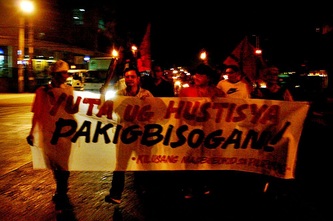
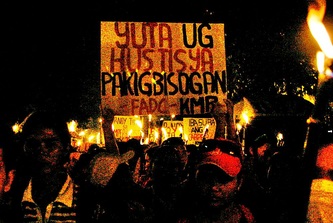
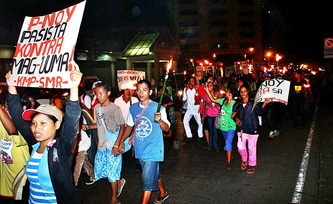
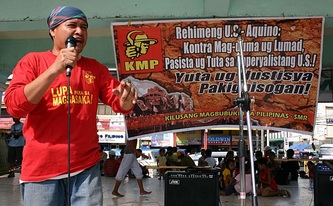
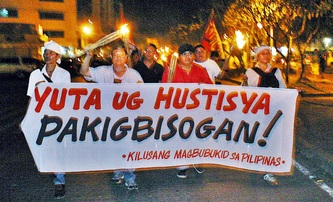
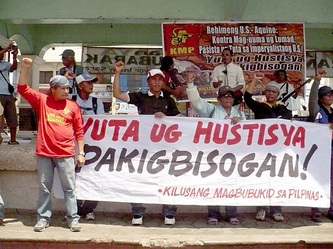
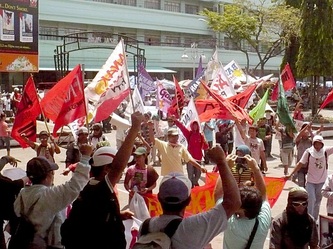
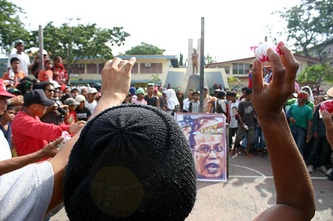
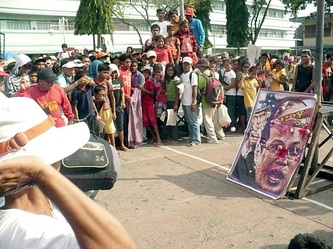
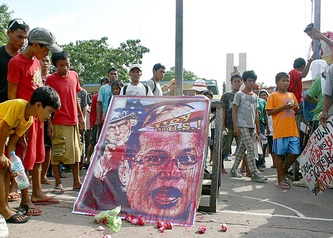
 RSS Feed
RSS Feed